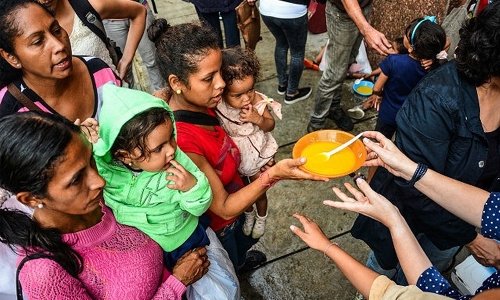Backup plan is needed to prevent Venezuelan famine
Nicolás Maduro has a knack for defying prophecies of his demise. When he was elected president of Venezuela in 2013, people said he would not last 12 months in office. Thirteen months later, when protests racked the nation, people said his days were numbered. The year after that, when opposition parties won a congressional majority, and again when they fought for a recall referendum in 2016, and yet again with the return of mass protests in 2017, people said, this will be the end of Maduro. Most of all, Maduro was not meant to survive this year’s campaign to oust him — an international effort that began in January and reached a peak last weekend. And yet, Maduro remains the de facto president of Venezuela.
This reality creates a problem for the United States. Last month, the United States imposed economic sanctions designed to hasten Maduro’s exit. If he goes, the world will rejoice. If not — if Maduro hangs on to power — the sanctions will deepen Venezuelans’ suffering. To prevent this, the United States needs a backup plan. No one questions that Maduro has wrought destruction: the worst economic collapse in recorded Latin American history, relentless trampling of political rights and merciless police violence.
Poverty has risen to 94 per cent from 27pc. For millions in Venezuela and around the world who want this regime to end, hope appeared last month in the form of the opposition politician Juan Guaidó. On Jan 23, Guaidó took the oath of office as interim president of Venezuela, promising to call for elections; the United States immediately recognised his presidency. Since then, the Venezuelan people have protested en masse. Along with the Lima Group, the Organisation of American States and the European Union, Venezuelans have pressured their military to force Maduro out.
President Donald Trump threatened to invade. Last weekend, Richard Branson sponsored a star-studded aid concert on the Colombia side of the border with Venezuela. More than 50 countries have recognized Guaidó, adding to the chorus of voices calling for Maduro’s exit. Sanctions are seen as a key tool to foment regime change. Last month, the United States imposed sanctions against PDVSA, Venezuela’s state-owned oil company; required American companies to pull out of the Venezuelan oil sector; and threatened to punish non-United States businesses that continue to buy Venezuelan oil. An earlier round of sanctions banned debt trades for government-issued bonds and bonds issued by PDVSA, effectively barring Venezuela from financial markets.
The Trump administration estimates that sanctions will cost the Venezuelan economy $11 billion, while analysts estimate the cost to be closer to $4 billion. Either way, that’s a significant fraction of last year’s total goods imports of $11.7 billion. And last year’s imports were not enough to feed Venezuelan children. Already, 80 per cent of Venezuelan families lack food security, and undernourishment has tripled. sTo understand the danger, consider what happened in Iraq. There, the international community imposed sanctions as part of an effort to weaken the regime of Saddam Hussein. But it did not fall, and the sanctions remained in place. Iraqi children suffered.
Before the embargo, Iraq had one of the highest per capita food availability ratings in the Middle East. Even so, one-quarter of Iraqi children were malnourished after six years of sanctions, and tens of thousands died. Venezuelan children are facing sanctions on already empty stomachs. Missing more meals could condemn them to starvation. Trump has said that he has a backup plan for Venezuela. “I always have a Plan B,” he said. “I always have a Plan B, and C, and D, and E, and F.” Perhaps Plan B was to invade, despite well-founded pessimism about where invasion would lead. But that option faces mounting political hurdles. On Feb 25, nine Latin American countries along with Canada and the European Union unequivocally rejected military intervention.
Twenty-one members of the House of Representatives have sponsored a bill that would forbid military action in Venezuela without congressional authorisation. And according to opinion polls, a majority of Venezuelans oppose an invasion. A better backup plan would allow Venezuela to exchange oil for essentials. For example, the United States could buy Venezuelan oil so long as proceeds accrued to escrow accounts — subject to international monitoring — are used only for purchases of food, medicine and oil-sector infrastructure. As in the case of Iran, the United States could exempt from sanctions third countries that trade with Venezuela (such as India and China), again on the condition that proceeds would go toward essentials.
And while aid alone will not fill the hole left by sanctions, the United States could participate in multilateral efforts designed to disarm rather than encourage Maduro’s abhorrent effort to block humanitarian assistance. In Iraq an oil-for-food program did alleviate suffering despite corruption and mismanagement. But it arrived seven years after the imposing of sanctions. Venezuelan children cannot wait seven years. Without a Plan B, Washington has made a bet that’s safe for Trump and dangerous for the Venezuelan people. If sanctions contribute to a quick Maduro exit, Trump will look like a hero. And if they don’t, the United States president will wash his hands of the whole mess.
He can’t be blamed if Venezuelans starve, can he? Weren’t Venezuelans starving before the sanctions? You say sanctions made things worse. Trump says fake news. Some have argued that depriving the Venezuelan government of cash is a moral imperative, because not doing so amounts to paying a hostage-taker. We should not reward hostage-takers like Nicolás Maduro, the thinking goes. But of course, in practice, the international community has done it, in Iraq and elsewhere. We pay hostage-takers not because it feels good or right. We do it when the alternative is worse
Related Posts

